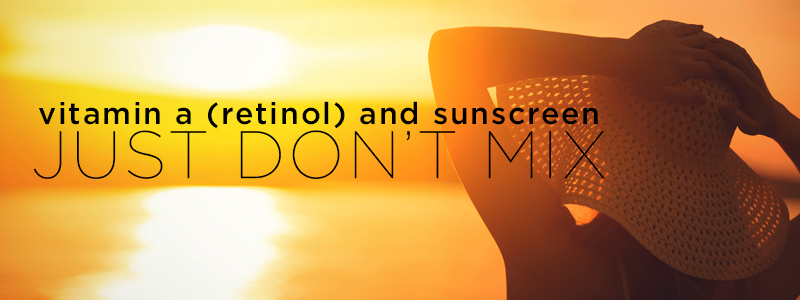
Vitamin A (Retinol) and Sunscreen Just Don’t Mix!
Retinol, also known as vitamin A, is added to many cosmetics, including sunscreens. Any product with added vitamins should have added bonuses, right? Here’s where things get tricky—again. Vitamin A is neither good nor bad. It’s both, based on how and when you use it. And, like many things, it’s not always used in the best or safest ways.
Vitamin A is popular in skincare products because this fat-soluble vitamin promotes membrane health. Since the largest membrane in your body is your skin, it seems like the ideal additive. You may see it on the label as retinol, retinyl palmitate or Retin-A, since these are all cosmetic compounds of vitamin A. Retinol and retinyl palmitate are milder forms of the antioxidant, and Retin-A is a prescription-strength name brand used to treat acne and prevent wrinkles.
WHAT’S THE CATCH WITH VITAMIN A?
Like sunshine, vitamin A can both help and hurt you. According to the Environmental Working Group, “(The) FDA raised a concern that extensive, daily skin application of vitamin A creams may build up in the woman’s body a high enough level of vitamin A that may be toxic to the developing fetus.” That means any skincare product containing retinol, retinyl palmitate or another form of the vitamin isn’t a good daily option while carrying a child.
VITAMIN A IS BENEFICIAL—JUST NOT IN THE SUN!
When used to treat acne and slow skin aging, Vitamin A can cause your skin to peel and blister, clearing the way for younger and smoother, but more vulnerable skin cells. These new cells are also at a higher risk for skin damage from UV rays. On the sunny side, when applied to skin, vitamin A can reduce wrinkles, improve healing and fight acne. Many conventional sunscreens are formulated with vitamin A in order for manufacturers to market products as “anti-aging.” Unfortunately, retinol has also been shown to increase one’s risk of melanoma by speeding the growth of cancerous tumors and lesions when used on sunlight-exposed skin Red flag: Isn’t sunscreen supposed to be used in the sun There are even warnings on the label for Retin-A, the prescription-strength version of vitamin A, that warns against exposure to sunlight and sunlamps.
These warnings are in accordance with the FDA’s labeling regulations, yet the FDA doesn’t restrict the use of vitamin A in sunscreen. That’s concerning since retinol and retinyl palmitate are simply more mild versions of the same thing. If you’re scratching your head on that one, don’t worry; we are, too.
WHAT’S A SUN-SAVVY SOUL TO DO?
Feel free to harness the anti-aging or acne-fighting benefits of vitamin A. Just do it at night! For your daytime routine, look for creams and, especially sunscreens, that are free from retinol or retinyl palmitate. And of course, all Goddess Garden sunscreen have always been free from all forms of vitamin A, so you know you’re fully protected.


